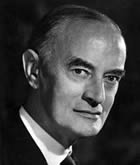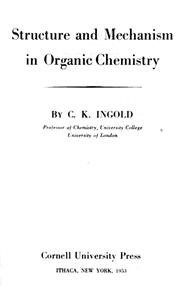However the controversy abated, and by 1939, Ingold's ideas, terminology and nomenclature for reaction mechanisms (e.g. electrophilic, nucleophilic, inductive, mesomeric, SN1, SN2 etc) were generally accepted and employed everywhere. Much of his work was done in collaboration with E.D. Hughes .
His monumental work "Structure and Mechanism in Organic Chemistry" (the frontispiece of the first Edition is shown at right) is a cornerstone of organic chemistry.
He received many honours including the Longstaff Medal in 1957 and a knighthood in 1958. He was largely responsible for the content of the new B.Sc. (Special) Degree which appeared in 1945. He continued lecturing after his retirement.
A biography " Sir Christopher Ingold- A Major Prophet of Organic Chemistry " (compare it with Robert Robinson's autobiography) by Kenneth T. Leffek was published recently. A review of the book appeared in J. Chem. Ed. in 1997. The best way to obtain a copy of this book is from the author: Ken Leffek, 980 Kentwood Terrace, Victoria, BC, Canada, V 8Y 1A6. Telephone and fax: +1 (250) 658 1329. |


